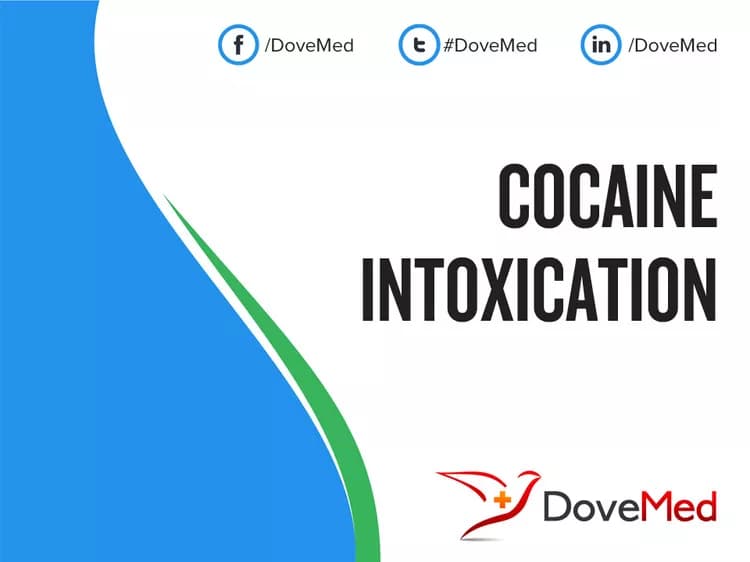What are the other Names for this Condition? (Also known as/Synonyms)
- Acute Cocaine Intoxication
- Nose Candy Intoxication
- Snow Intoxication
What is Cocaine Intoxication? (Definition/Background Information)
- Cocaine is an illegal drug stimulant and a highly addictive substance derived from the leaves of the erythroxylon coca plant. The plant is commonly grown in Peru or Columbia
- Cocaine Intoxication occurs after ingestion of cocaine when the central nervous system (brain) is directly affected. Cocaine is a powerful stimulant and user feels happy, energetic, and talkative
- Apart from this, an intoxication causes dilated pupils, rapid heart rate, high blood pressure, tremors, decreased appetite, chest pain, sweating , and tremors
- The substance may cause severe compilations such as heart attack, stroke, convulsions, hyperthermia, and even sudden death
- The treatment of the condition includes the use of medications and counselling therapy. A continued abuse of the drug will more than likely turn the condition from intoxication to dependence
Who gets Cocaine Intoxication? (Age and Sex Distribution)
- Cocaine Intoxication can affect any individual using the drug. Individuals most likely to use cocaine include college students and young adults
- Intoxication may be observed in individuals of any race and ethnicity
What are the Risk Factors for Cocaine Intoxication? (Predisposing Factors)
The primary risk factor associated with Cocaine Intoxication is the easy access and use of cocaine. Other factors include:
- Surrounding oneself in a cocaine-friendly environment also increases the chances of cocaine use and intoxication
- Family history of addiction
- Abuse of other drugs, such as alcohol or opium
- History of childhood trauma, such as physical or sexual abuse, violence, or losing a parent
It is important to note that having a risk factor does not mean that one will get the condition. A risk factor increases ones chances of getting a condition compared to an individual without the risk factors. Some risk factors are more important than others.
Also, not having a risk factor does not mean that an individual will not get the condition. It is always important to discuss the effect of risk factors with your healthcare provider.
What are the Causes of Cocaine Intoxication? (Etiology)
- Cocaine increases the release of dopamine, serotonin, and norepinephrine (all chemicals in the brain). These chemicals manage the feelings of pleasure and alertness
- When cocaine is used, the drug mimics the effects produced by these chemicals at an increased level and a “high” is experienced
- Cocaine Intoxication occurs soon after the use of the drug. When a large concentration dose is used, the “high” associated with the substance will last longer
What are the Signs and Symptoms of Cocaine Intoxication?
Signs and symptoms of Cocaine Intoxication may include:
- Dilated pupils
- Insomnia
- Sweating
- Chest pain or pressure
- Anxiety and agitation, irritability
- Rapid heart rate, high blood pressure
- Tremors
- Decreased appetite
- Feeling of extreme joy or euphoria
How is Cocaine Intoxication Diagnosed?
A diagnosis of Cocaine Intoxication includes:
- It is diagnosed when the characteristic symptoms, as well as a dramatic decline in daily functioning, are observed
- Symptoms cannot be due to another condition and must occur shortly after cocaine use
The diagnostic tests usually performed are:
- Cardiac enzymes - to look for evidence of heart attack
- ECG - to check electrical activity of the heart
- Toxicology (poison) screening
- Urine analysis
Many clinical conditions may have similar signs and symptoms. Your healthcare provider may perform additional tests to rule out other clinical conditions to arrive at a definitive diagnosis.
What are the possible Complications of Cocaine Intoxication?
Complications associated with Cocaine Intoxication include:
- Panic attacks
- Paranoia
- Convulsions
- Perforation of nasal septum
- Hallucinations
- Hyperthermia - significantly elevated body temperature
- Stroke
- Heart attack
Severe Cocaine Intoxication is linked to sudden death.
How is Cocaine Intoxication Treated?
The treatment of Cocaine Intoxication may include:
- Monitoring the patient’s heart rate, blood pressure, temperature, and respiratory rate to make sure that complications of an intoxication do not arise
- Benzodiazepines, a type of medication, may be given to control blood pressure, heart rate, and to treat anxiety and agitation
- Intravenous fluids may be administered
- Counseling is highly recommended to prevent further drug abuse and potential addiction
How can Cocaine Intoxication be Prevented?
Cocaine Intoxication can be completely prevented by abstaining from cocaine use.
What is the Prognosis of Cocaine Intoxication? (Outcomes/Resolutions)
- Cocaine is a highly-addictive drug; if the drug use is continued, the user will more than likely become dependent on the drug
- Acute effects of Cocaine Intoxication use will generally subside within 30 minutes, but the substance can seriously affect one’s health
Additional and Relevant Useful Information for Cocaine Intoxication:
Other than alcohol, cocaine is the most common cause of acute drug-related emergency department visits in the United States.
Related Articles
Test Your Knowledge
Asked by users
Related Centers
Related Specialties
Related Physicians
Related Procedures
Related Resources
Join DoveHubs
and connect with fellow professionals


0 Comments
Please log in to post a comment.